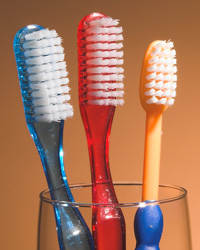Are Your Teeth Temperamental? Dealing With Sensitive Smiles
Are you overly sensitive? Relax, it has nothing to do with crying during life insurance commercials. Millions of adults struggle with hypersensitive teeth, which means they are sensitive to hot and cold temperatures, very sugary or acidic foods and drinks and vigorous tooth brushing. This kind of sensitivity is often called "dentin hypersensitivity."
Dentin is the tissue that makes up the core of each tooth. Above the gum line, dentin is protected with a coating of enamel. Unfortunately, as enamel is worn away or decayed, dentin becomes exposed and receptive to sensations that cause painful nerve responses. This can also occur as the result of receding gums, a common symptom of gum disease.
So, what causes sensitive teeth? A number of things may be to blame. Over-zealous brushing with a firm bristled tooth brush or abrasive toothpaste can lead to dentin hypersensitivity, as can gum disease, which is the result of poor brushing and flossing habits. Your diet may also play a role, as frequent consumption of acidic foods and drinks can chemically dissolve tooth enamel. Finally, abnormal wear on tooth surfaces from chronic clenching or grinding of teeth, nail biting and chewing on hard objects can lead to sensitive teeth. To avoid the problem, brush and floss daily to maintain healthy gums and protect dentin from exposure. Avoid vigorous tooth brushing with a hard-bristled toothbrush.
If you're already suffering from overly sensitive teeth, your best bet is to contact your dentist for guidance on dental hygiene. In the mean time, there are products that can help. Desensitizing toothpaste used in conjunction with a soft-bristled toothbrush can help. Toothpaste designed for those with sensitive teeth can reduce the pain associated with the condition after only a few days of use.

+Jim Du Molin is a leading Internet search expert helping individuals and families connect with the right dentist in their area. Visit his author page.
Raisin Eyebrows: Is Dried Fruit Good for Your Teeth?
Do you remember how disappointed you were as a kid when some concerned adult dared put raisins in your Halloween bucket? Your mother was probably relieved, convinced they would be far better for you and your pearly whites than the rest of the junk food you'd strung out across the kitchen table. Ask a pediatric dentist, however, and you might get a different story.
It's true that there are a number of benefits to eating raisins. They're low in fat and cholesterol, but boast plenty of fiber, calcium and potassium. Unfortunately, they're also both sticky and high in sugar, putting them high on the list of foods that can cause cavities. Some health professionals lump them in with all the other typical junk foods kids eat. Don't worry, raisins aren't the only foods once thought healthy that can contribute to tooth decay and poor oral health. Go ahead and add other dried fruit, sweetened cereals and even fruit juices to the list.
Don't chuck raisins out just yet, however. According to Vincent Iannelli, M.D., raisins were recently found to contain phytochemicals, which have been found to inhibit the growth of bacteria that are commonly linked to cavities. Note that this study was conducted in a lab, and no study has even been done to show that cavities are either more or less likely to find kids who eat raisins.
So, where does this leave you? A good general rule when it comes to eating for good health is to stick with whole fruits and vegetables whenever possible. If you must eat something that you aren't sure is good for you, do it in moderation. For good dental hygiene, be sure to drink lots of water, and always either brush your teeth and rinse your mouth out with warm water after eating sugary or acidic foods to prevent tooth decay!

+Jim Du Molin is a leading Internet search expert helping individuals and families connect with the right dentist in their area. Visit his author page.










